
Interpersonal Effectiveness involves attending to positive relationships and connecting with others. The skill also involves ending toxic or destructive relationships.
Effective and positive relationships involve both people contributing in a positive way and nurturing the relationship. Healthy relationships are reciprocal. They are based upon mutual respect, trust, and acceptance.
It is paramount to accept the other person as they are. It is destructive to the relationship when one partner tries to change the other partner and coerce them to behave in a particular manner. This is the opposite of accepting the other person as they are.
Oftentimes, with insight and willingness, both partners can recognize their role in contributing to the dysfunction and change their destructive behavior patterns. They can change together and strengthen the relationship in a positive way.
In other situations, only one partner is willing to make changes to end the toxicity in the relationship. In this case, the relationship remains destructive. In order to preserve self-respect and to grow as a person, the relationship must be ended.
Interpersonal Effectiveness skills will provide people with the tools to set boundaries and limits (say no), ask for what they want, preserve self-respect, validate others, and be respected by others. All of these skills assist in fostering positive relationships in all domains (professionally, socially, and domestically).